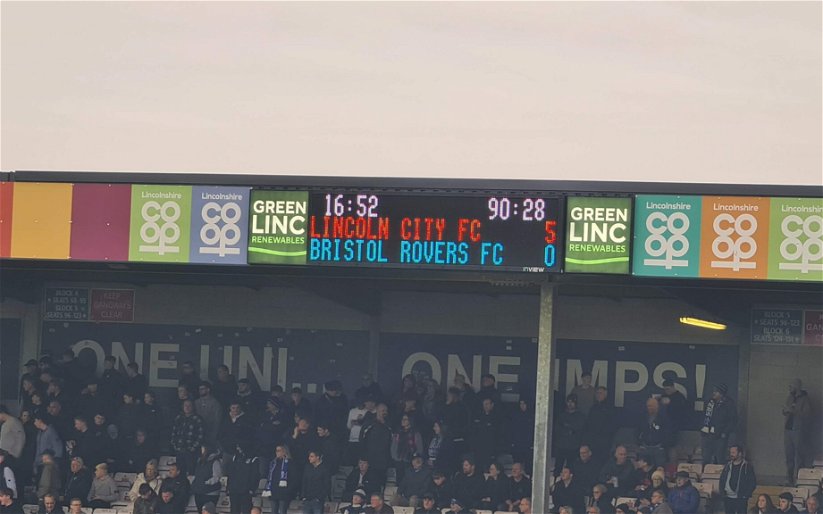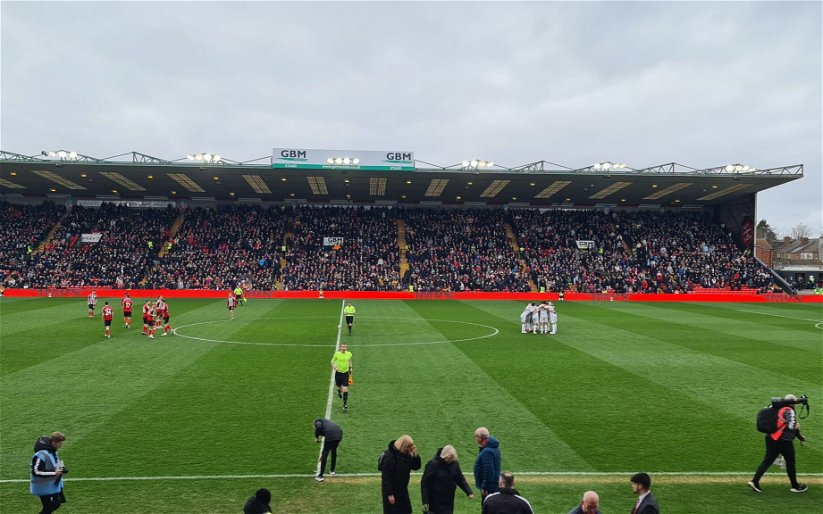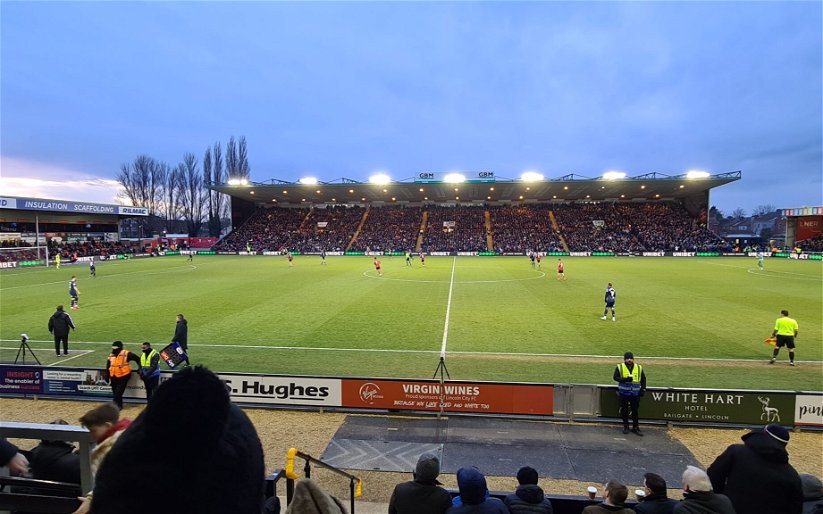Lincoln City’s impressive progress to the semi-finals of the Checkatrade Trophy in January has highlighted the current conflicts in the game…
Lincoln City’s impressive progress to the semi-finals of the Checkatrade Trophy in January has highlighted the current conflicts in the game and specifically brought into sharper focus the inclusion of U21 teams in the competition. The fact that City added two more giant killings to their growing collection has been overshadowed to a certain extent by the fact they have drawn Chelsea U21 in the semi-final. That is unfortunate in some ways but it does give us the opportunity to examine how much of a problem it really presents.
Let’s begin with some history. The roots of the whole problem can be traced to the Football Association’s laughable four-point plan to reform the game which was vomited forth onto an unsuspecting public in May 2014. Finding a solution to the lack of young English talent in the game was at the heart of the commission’s remit and suggested a reduction in the number of non-English players in Premier League squads. That is nothing new, and has been mooted for many years. However, the part of the report that caused real concern was the proposal for a new League Three from 2016-17 comprising ten Premier League B teams and ten clubs from the Conference. There were additional requirements to be met by the B teams, including a stipulation that 80% of each squad had to be home-grown. Promotion and relegation would then take place, but B teams would not be permitted to play above League One level.
England manager Roy Hodgson gave his enthusiastic backing to the plan, which was not entirely a surprise: he was part of the team that compiled it. FA chairman Greg Dyke confirmed that the big clubs were very enthusiastic too, believing that the gap between Premier League and academy level had regrettably widened significantly since 1992. Dyke intended the reconstruction to lead to England winning the World Cup in 2022, an idea as deranged as the measures he was proposing to bring it about. Criticism of the plan was both immediate and immense, with almost every professional club outside of the Premier League condemning the B team idea in particular. The EFL promised to discuss the proposals with its members at some point in the future and presumably placed the report on a shelf to gather dust.
The plans of the FA and the Premier League to revolutionise the structure of our game suffered a fatal blow on 22 September 2016 when, following a meeting of its clubs, the EFL finally confirmed that the inclusion of Premier League B Teams would not be permitted to form part of any ongoing discussions for the Whole Game Solution. Things deteriorated further until, on 16 November 2016, the EFL confirmed that discussions with the Football Association over the Whole Game Solution were officially at an end after agreement could not be reached over FA Cup scheduling. The FA admitted to being surprised at the rejection of its proposals, emphasising once more exactly how detached from popular opinion it had inexorably become.
As things stand, the EFL is not open to further discussion on the inclusion of B teams within the Football League. It has been adamant from the start that the proposal would not be supported by its members, and that stance would not change. It must be remembered that the EFL cannot accept any proposals without express permission of its members. Therefore that should have been the end of the matter, yet it has not gone away entirely. Some supporters still see the inclusion of B/U21 teams within the Checkatrade Trophy as the thin end of a large wedge, rather than the palliative it really represents. Could it be the start of something more sinister?
Spain is frequently quoted as the prime example of how successful the presence of B teams in the upper echelons of a football league structure can be, so let’s take a look at it.
At present there are around 60 B teams playing in the extensive Spanish football league pyramid, although none can play higher than Liga 2. B teams can play in the national cup competitions, highlighted in ridiculous fashion in 1979-80 when Real Madrid met its own B team Real Madrid Castilla in the Copa del Rey final. The game was also played at the Bernabeu, so bizarrely both teams were theoretically playing at home. The first team won 6-1, presumably on the orders of the club president Luis de Carlos.
Supporters of the B team fantasy would have us believe that Spain introduced reserve teams into its football pyramid in order to improve the performance of its national team. The same people will point to the recent dominance of world football by Spain as conclusive proof that it works and is the path others should follow. Unfortunately for the fantasists, it is not true. B teams have been a feature of Spanish football since before the Second World War, and were originally admitted to make up the numbers – there were not enough standalone clubs of sufficient magnitude to make the league truly competitive and substantial. Here we immediately encounter the first problem: B teams are a traditional feature in Spain, but in England they are proposing to impose a similar structure on a 130-year-old league pyramid consisting of well over 100 existing professional clubs who have fought very hard over many decades to be there.
Furthermore, the English Football League is far older than its Spanish counterpart, founded in 1888; a professional football league did not get going in Spain until 1929. With the Spanish Civil War and the Second World War intervening almost immediately, it could be said that professional football in Spain is effectively a post-war sport. Indeed, the first official football match did not take place in Spain until 1890 when the country’s two oldest football clubs Sevilla and Recreativo de Huelva met in Seville; even then, all but four of the players involved were British. Even when the original Primera División got under way in 1929, there were only ten clubs in the entire league; at the same time, there were 88 clubs in the English Football League plus professional elements within the Southern League in particular.
Therefore English league football is far more venerable and traditionally resilient than the majority of world leagues, and the degree of professionalism within its pyramid goes far deeper in terms of the number of clubs participating and the number of people watching those clubs. Furthermore, Spanish football has been dominated by two clubs since time began: a survey from 2014 confirms that an astonishing 63.3% of active football supporters in Spain are followers of Real Madrid and Barcelona, creating a polarisation not present in the English game.
The panel below demonstrates the vast differences in average attendances and the number of professional clubs in each country (remembering that a number of the clubs in the upper tiers in Spain are B teams of clubs higher up in their pyramid).


It is immediately apparent that English football and Spanish football come from two very different places and have very different characteristics. That makes comparisons between them very dangerous from a cultural point of view.
Nevertheless, in January 2017 Manchester City manager Pep Guardiola made a renewed call for B teams to be allowed to play in the Football League because he feels the academy system is not competitive enough and does not prepare young players physically for first team football. In an interview with The Telegraph, he boldly stated:
“English football has a real problem…English clubs fail to prepare their young players for the pressure of the Premier League.”
The majority might say that is a problem for Manchester City and the Premier League, not for English football.
However.
His solution is to allow Premier League B teams into the Football League on the basis that the players can play competitive football in front of larger crowds like they do in Spain. He adds that Barcelona and Real Madrid’s B teams play in front of 40,000 to 45,000.
The Telegraph journalist appeared not to question this or conduct any checks to confirm Guardiola’s bold statement.
Guess what?
The average attendance last season at FC Barcelona B was 1,656, whilst Real Madrid Castilla pulled in a huge average of 1,208. As the panel above clearly shows, the players are not playing in front of large crowds at all, even away from home, and are clearly a long way short of top-flight playing ability. Only two B teams currently play above the third tier, where the average attendance last season was a mere 1,503.
In case anyone thinks these numbers are deliberately selective, average attendances for other Spanish Liga B teams include Sevilla (1,806), Villareal (1,200), Espanyol (1,087) Athletic Bilbao (911), Real Sociedad (639) and Granada (381).
So Mr Guardiola is very conveniently getting his facts wrong. And for the former manager of FC Barcelona B, you have to wonder why that might be.
But there is more. At the same time, he laments the fact that Manchester City’s 7,000-capacity stadium at their training ground is always empty for reserve and academy games. There is a very good reason for that: the standard of football is poor and very far removed from what the public will pay good money to watch. The same situation as the B teams in Spain, in fact.
The madness does not end there either. Entirely unencumbered by the facts, Guardiola goes one stage further and actually believes his B team should play in the Championship. At no time does his blinkered arrogance consider what would happen to the genuine football clubs displaced from their merited place in the Championship, and also what would happen to all the displaced clubs in the divisions below them. Assuming that Manchester City would not be the only B team admitted, at the end of the chain of dominoes there could be a dozen or more clubs dropping out of the Football League entirely. Those clubs have long histories and in almost every case will be better-supported entities than Manchester City’s B team could ever be. Is he honestly suggesting we surgically remove great clubs like Sunderland (current average crowd 27,694), Sheffield Wednesday (26,080), and Birmingham City (20,722) from the Championship and replace them with a bunch of kids watched by three dogs and a smattering of duty-bound and extremely bored parents? Ludicrous in every way.
If Mr Guardiola can assure us he has considered all of this, and has an equitable solution, let’s talk. But we will not be talking, because his premise is apparently founded on a catastrophic misunderstanding of English football and some spectacularly erroneous figures.
“That is the future of English football,” he states unequivocally.
In that case, thank God you are not in charge of the future of English football, Mr Guardiola, and at no time should you be allowed anywhere near it. On this evidence, your next port of call after leaving Manchester City may well be managing Cloud Cuckoo Land FC.
Let’s take a look at the players next. Is there any evidence to support the assertion that regular competition would make them better players? They have regular competition already. Furthermore, a significant number already enjoy loan periods with Football League clubs, but how many actually make a name for themselves whilst out on loan? Perhaps there is an uncomfortable truth in there somewhere: that the majority of the players coming through the Premier League academy system are simply not good enough for the Premier League. From the evidence of the Checkatrade Trophy so far, a good number are inadequate for the Football League too. If the players individually cannot hack it whilst on loan in the Football League, why would it be different if they were playing in a team full of contemporaries at the same level?
An additional argument suggests that the humble supporters of EFL clubs will get the chance to see the stars of the future, but we have already seen the weakness in that argument. Perhaps it gives Football League managers the opportunity to watch these young stars and possibly make a move for them on loan, but that is spurious too. Firstly, every major U23 game is televised on club satellite channels, so there is nothing to prevent those managers from monitoring the players in the first place. Secondly, the Premier League clubs would have to be willing to loan the best players, not just the dregs they are desperately trying to find permanent homes for. Thirdly, how could the U21 team loan players to other clubs when they would need those players to play in their own team? Fourthly, are these fledgling players any better – or even as good as – the professional players already in the EFL? The shakeout of professional players at the end of every season is immense: some would say there are too many players in the game already.
The clear gulf in ability between existing EFL clubs and their U21 counterparts presents a further problem. The theory suggests that the B team youngsters would benefit from playing in a more competitive form of football, but would that be the case in practice? Given that a home game against a B team would indicate an easy win as things stand, the EFL clubs would surely rest their better players for those games. The B team would end up facing another B team, reducing the public appeal of the game still further.
The argument that playing in the Football League would give their young players the opportunity to play in front of bigger crowds does not stand up to scrutiny either. Overall attendances for Checkatrade games between EFL clubs and U21 sides have been terrible, suggesting that no one is interested in the slightest. Consider this: what might the attendance be for Wolves v Manchester City B in the Championship, compared with Wolves v Birmingham? Birmingham have been demoted, remember, and are at home to Rochdale instead. The loss of income for just those two games would be immense, and it would be replicated every week for every club similarly affected by it.
Perhaps it is the academy system itself that is the problem, rather than the players not having any competitive element to their games. Is the coaching inadequate? Are they coaching the life out of young players from an early age? Are they feeding hundreds of players through their sausage machine of a system who simply are not good enough and never will be?
Surely the solution to blooding young players in the game is to play them in their own first teams in preference to the dozens of foreign players each club seems happy to import for obscene amounts of money? The answer may well lie in placing restrictions on the number of non-English players in the Premier League, taking us back to the most important part of the Whole Game Solution. Why should the Football League be forced to accept the responsibility in lieu by asking it to relegate great old English football clubs in order to accommodate the misguided fantasies of Mr Guardiola and his self-interested chums at the Premier League?
If there is no logical argument for it, there is always financial compensation. The football authorities responded to the B team vote by increasing the prize money for the Checkatrade Trophy for two seasons from 2017-18. Why did they do that, I wonder? But the amount of money required to compensate every EFL team whose gate receipts and commercial income have plummeted because of the decision to include B teams in the professional league structure would be immense. Is that really logical either?
Bizarrely, Lincoln City did not have the opportunity to vote on the changes to the Checkatrade Trophy for this season despite the fact that they would be playing in it; relegated Leyton Orient and Hartlepool United were given votes even though the National League and the FA Trophy were their imminent destination. How crazy is that, on a scale of one to ten? Just another example of how the football authorities nationally and globally continue to run the game with breathtaking incompetence and more than a touch of lunacy.
As a result of Lincoln’s success, one genius on The Fishy called Lincoln fans ‘scabs’ for supporting their team in the competition, and wrote it in capital letters. What a moron. Lincoln have already confirmed that they would vote against the inclusion of U21 teams, but they were not asked. Therefore, why should Lincoln’s fans boycott a competition in which they had no say? Why should Lincoln City suffer the financial penalty of a boycott when they had no part in its formulation? For the good of football in general? Alright, let’s consider that.
Exactly how real is the threat, on the evidence of the Checkatrade Trophy?
The presence of Chelsea U21 in the semi-final has disturbed some supporters who fear it justifies the Premier League’s insular belief in the B team concept. Without doubt there is a risk that they will occupy a place in the final that should by rights have gone to a bona fide EFL club, and that is unfortunate. The boycotters think it will only reinforce their claims for places in the Football League, but it is hard to see the truth of that. Chelsea have an exceptional side, winners of the FA Youth Cup for the last four years, but let us make one thing absolutely clear: that is due in large part to the presence of some major signings. The likes of Belgian international Michy Batshuayi and Welsh international Ethan Ampadu cost serious money and are not products of the Chelsea Academy. Chelsea’s presence in the semi-final has nothing to do with the development of talented English players and in no way satisfies the theory behind the B team utopia.
As for the rest, the majority of U21 teams failed miserably in the group stages, with twelve of the sixteen exiting the competition at the first hurdle. Worse still, those twelve teams won just three games between them out of thirty-six played – a win percentage of just 8%. That is pathetic by any standards. If anything, this year’s competition has shown that U21 teams are light years away from being good enough to compete against professional teams, not that they are good enough. On that evidence, we should be more than happy to accommodate them every year in the Checkatrade Trophy because it increases our chances of progression in the tournament immensely.
There is a fundamental, inescapable, practically insurmountable problem which renders the inclusion of B teams within the EFL extremely improbable. Premier League B teams are not professional football clubs and will never be accepted as such because they are not fit for purpose within the context of English league football. The young players the U23 academy system is producing are not good enough to compete regularly in the Football League as standalone teams. And to compete at Championship level? Absolutely crazy. No one wants to watch them play, not even supporters of their own clubs, so why do they expect anyone else to want to do so? The Spanish system has proved that beyond any doubt. The Football League cannot be used as a vehicle for trying to correct the abject failure that the Premier League’s own U23 league structure has been, and Football League members will never vote in favour of it. No one wants to watch it because the product is rubbish. So what is everyone afraid of?
The Football League is not a plaything for the Premier League and must never allow itself to be manipulated by it. The idea of admitting B teams into its structure – even at a low level – is an insult to every club that has competed fairly and is there on merit. Here’s an idea: if the Premier League wants its B teams to play competitive football, that is all well and good. But make them start at the very bottom, in Sunday league football. If they are good enough, they will work their way up into Saturday football and eventually towards the higher echelons.
I have a feeling that idea will be dismissed in exactly the same way we should dismiss the idea of B teams in the Football League: completely and irrevocably.
And that – hopefully – should be the end of that.
Who did our members consider to be January’s star players?
The Player of the Month for January will come as no surprise, as NEAL EARDLEY turned in a series of outstanding performances at Sincil Bank in particular. The classy defender has moved into second place in the Player of the Season rankings and is closing in on leader Sean Raggett with every game. The sooner the club can tie him to a longer-term contract, the better.
Second place goes to defensive colossus MICHAEL BOSTWICK, who excelled in two different positions this month, occasionally in the same game. The careless loss of the beard seems not to have sapped his strength at all.
Third place goes to born-again striker MATT GREEN, who is terrorising both League Two and League One defences alike. With twelve goals already to his name, can he become the latest City player to reach the magic twenty in a season?
This month’s special mention goes to Danny Rowe, who has settled into his new club in some style. Can he keep up his current average of 7.00 per game until May?
The average team score of 6.71 is the third-highest of the season.
1. Neal Eardley 7.32
2. Michael Bostwick 7.19
3. Matt Green 7.18
4. Danny Rowe 7.00
5. James Wilson 6.91
6. Harry Anderson 6.87
7. Sam Habergham 6.77
8. Luke Waterfall 6.66
9. Alex Woodyard 6.63
10. Matt Rhead 6.61
11. Nathan Arnold 6.60
12. Lee Frecklington 6.52
13. Paul Farman 6.37
14. Ollie Palmer 6.24
15. Elliott Whitehouse 6.22
16. Sean Raggett 6.17
17. Cameron Stewart 6.06
18. Sean Long 6.04
19. Jordan Williams 5.98
20. Josh Ginnelly 5.83
21. Billy Knott 5.80
22. Josh Vickers 5.50
Individual ratings by match:
Luton: Matt Green 6.66
Rochdale: Michael Bostwick 7.60
Notts County: Danny Rowe 7.91
Barnet: James Wilson 7.07
Peterborough: Neal Eardley 8.10
Newport: Neal Eardley 8.65
So where does that leave us regarding the current player of the season standings?
1. Sean Raggett 7.12
2. Neal Eardley 7.04
3. Alex Woodyard 7.02
Home player of the season:
1. Luke Waterfall 7.26
2. Neal Eardley 7.18
3. Harry Anderson 7.14
(Danny Rowe currently averages 7.63 after three games)
Away player of the season:
1. Sean Raggett 7.26
2. Michael Bostwick 6.88
3. Alex Woodyard 6.85
(James Wilson currently averages 7.07 after one game)
August Player Ratings: Why Sean Raggett Is In Serious Danger
September Player Ratings: Lincoln City Is The Perfect Antidote To The Dacia Duster
October Player Ratings: What Lincoln City Can Learn From Jack Kerouac
November Player Ratings: What We Need In January Is Taylor Haines
December Player Ratings: And A League Two Review
Average Player Ratings v Luton Town (a)
Average Player Ratings v Rochdale (a)
Average Player Ratings v Notts County (h)
Average Player Ratings v Barnet (a)
Average Player Ratings v Peterborough United (h)
Average Player Ratings v Newport County (h)
Thank you to Graham Burrell and Lincoln City FC for the photograph.
Jan Player Ratings: Time To Put The B Team Fantasy To Bed:https://t.co/9PM0YpUrze#ImpsAsOne #CheckatradeTrophy #EFL
— Vital Lincoln City (@VitalLincoln) February 3, 2018



